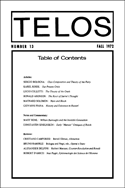In today’s episode of the Telos Press Podcast, David Pan talks with Matthew Sharpe about his article “Solitaire/Solidaire: Camus, Contemplation, and the Vita Mixta” from Telos 196 (Fall 2021). An excerpt of the article appears here. In their conversation they discussed the ways Albert Camus engaged himself politically during his life; how Camus justified his aesthetic work in relation to his political activity; how he responded to critiques of his focus on contemplation rather than political engagement; and how he understood the relationship between aesthetic contemplation and philosophical contemplation. If your university has an online subscription to Telos, you can read the full article at the Telos Online website. For non-subscribers, learn how your university can begin a subscription to Telos at our library recommendation page. Print copies of Telos 196 are available for purchase in our online store.
|
As an occasional feature on TELOSscope, we highlight a past Telos article whose critical insights continue to illuminate our thinking and challenge our assumptions. Today, Damien Booth looks at Ronald Aronson’s “Interpreting Husserl and Heidegger: The Root of Sartre’s Thought” from Telos 13 (Fall 1972). |
||||
|
Telos Press Publishing · PO Box 811 · Candor, NY 13743 · Phone: 212-228-6479 Privacy Policy · Data Protection Copyright © 2025 Telos Press Publishing · All Rights Reserved |
||||
 Readers familiar with Jean-Paul Sartre’s philosophical writings understand that he inherited a great deal of his conceptual language from the phenomenological projects of Edmund Husserl and Martin Heidegger. In “Interpreting Husserl and Heidegger: The Root of Sartre’s Thought,” Ronald Aronson strips away much of the mystery from Sartre’s concepts and, in so doing, reveals something about the framework that Sartre inherits that may well restrict his philosophical project from the very start. The accusation Aronson levies against Sartre is that he opens up a gap between consciousness and the world, a gap that Husserl wished to close by developing his transcendental phenomenological method. Essentially, Aronson thinks that Sartre abandons the very developments that made Husserl’s and Heidegger’s projects tenable in the first place: “we find [Sartre] erasing all the structures of consciousness (emotional, cognitive, and social) which make the world intelligible and making consciousness into a ‘nothing'” (47). As a result, Sartre becomes tangled up in his “own conceptual apparatus.” To find out why he gets so conceptually confused by these entanglements, Aronson traces Sartre’s key concepts back to their roots in Husserl’s cognitive projects and Heidegger’s hermeneutic phenomenology.
Readers familiar with Jean-Paul Sartre’s philosophical writings understand that he inherited a great deal of his conceptual language from the phenomenological projects of Edmund Husserl and Martin Heidegger. In “Interpreting Husserl and Heidegger: The Root of Sartre’s Thought,” Ronald Aronson strips away much of the mystery from Sartre’s concepts and, in so doing, reveals something about the framework that Sartre inherits that may well restrict his philosophical project from the very start. The accusation Aronson levies against Sartre is that he opens up a gap between consciousness and the world, a gap that Husserl wished to close by developing his transcendental phenomenological method. Essentially, Aronson thinks that Sartre abandons the very developments that made Husserl’s and Heidegger’s projects tenable in the first place: “we find [Sartre] erasing all the structures of consciousness (emotional, cognitive, and social) which make the world intelligible and making consciousness into a ‘nothing'” (47). As a result, Sartre becomes tangled up in his “own conceptual apparatus.” To find out why he gets so conceptually confused by these entanglements, Aronson traces Sartre’s key concepts back to their roots in Husserl’s cognitive projects and Heidegger’s hermeneutic phenomenology. 

